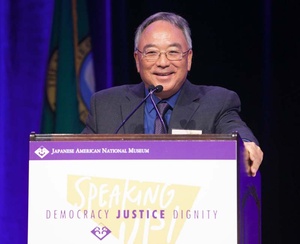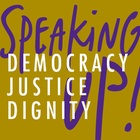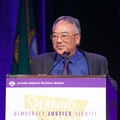This was the keynote speech from the Luncheon Banquet at the Japanese American National Museum’s National Conference “Speaking Up! Democracy, Justice, Dignity” in Seattle, WA on July 6, 2013. (Spoken presentation. Not to be cited as authority.)
Aloha to all, especially the veterans (my dad was one of you). JANM has organized a wonderful expansive “speaking up” convening. Touching everyone here, and crossing traditional borders to embrace artists, teens, Canadians, Aleuts and even Mindcraft and more. It’s special to be here with you on this 25th anniversary of the 1988 Civil Liberties Act—the Congressional acknowledgment of U.S. wrongs to Japanese Americans incarcerated on falsified grounds of “military necessity,” the presidential apology, $20,000 reparations and public education fund. In some respects, that’s all past and done. Yet the legacy of Japanese American redress—the grave injustice, the abiding human spirit, along with political redress achieved through the work of many—is still unfinished business. What things are being asked of us now, here and worldwide? And how might we respond in order to claim a legacy that’s about “justice for self and others?” That’s my talk.
Perusing the conference program, one thing jumps out. It’s the idea of the “impact” of history. That’s the forward-looking theme Greg Robinson and I advanced as national consultants to JANM in envisioning its new permanent museum incarceration or internment exhibit (I use those terms while mindful of the debate about terminology, including confinement, imprisonment, incarceration, American concentration camps). Back to the forward-looking theme: How do the lessons of history impact upon the challenges of today and tomorrow? This question makes the mass racial incarceration and redress past come alive now; it draws in young proactive Asian Americans and many others here and in other countries.
A key part of this living legacy, beyond national security/civil liberties, something much less in the spotlight, is Japanese American redress’ profound evolving impact on reconciliation (social healing) initiatives in the U.S. and internationally.
Themes. First visualize this: the world’s first publicly visible “truth commission” recording poignant live testimonies and investigating responsibility, and courts reversing course and pronouncing accountability, culminating in the congressional Civil Liberties Act. The goals: not only truth-telling and government accountability, but also social healing by doing justice—healing the lingering wounds of those wrongfully incarcerated and the wounds to American society itself for its failure of democracy.
Then consider, since 1988, the global explosion of truth commissions and redress/reconciliation initiatives targeting the persisting wounds of historic injustice. Reparative justice claims in the U.S. are advanced by African Americans, Native Hawaiians, Native Americans, Japanese Latin Americans, Latino farm workers and Filipino war veterans, and more. And globally, redress/reconciliation initiatives sweep across established and emerging democracies—Canada, New Zealand, South Africa, Sierra Leone, Rwanda, Peru, Argentina, Columbia, Chile, East Timor as well as Nepal, Sri Lanka, Cambodia, Japan and Korea. Some more genuine than others. Yet all parts of a global reparative justice phenomenon. Most with linkages to U.S. redress for Japanese Americans.
Indeed redressing the deep wounds of injustice has become a matter central to the future of civil societies everywhere. This is important. Whether a country heals persisting wounds is increasingly viewed as integral, (1) domestically, to enabling its communities to deal with pain, guilt and division linked to its past in order to live peaceably and work productively together in the present, and (2) globally, to claiming legitimacy as a democracy truly committed to civil and human rights (which affects a country’s standing on international security and responsible economic development). People, communities and governments all have a stake in justice that repairs. That’s another piece of the U.S.-Japanese American redress legacy.
But the story gets more complicated, bright and dark. Such that, I’ll suggest, the full legacy of redress—beyond the Japanese American community—is indeed unfinished business. To illuminate, three quick stories.
Three Stories. The first is about silence and rebirth. In 1983, in a public forum after the court coram nobis ruling nullifying the forty-year old conviction of internment resistor Fred Korematsu, a then 65 year-old Nisei woman told me: “They imprisoned us because of race. Destroyed our homes, businesses. Tore families apart. And we were innocent.” But after being told by the military, President, Congress and then Supreme Court that it was right, after feeling the hatred of so many, “I seriously came to doubt myself. I couldn’t speak of it for forty years, even to my children.” Now the court rulings and the prospects of redress, she said, “have freed my soul.”
A more complicated account. In 1991 the U.S. Office of Redress presented the first reparations check to the oldest Hawai`i camp survivor. I saw tears of relief mixed with sighs of joy. Many Japanese Americans worked hard for redress. African Americans and others lent crucial support. Yet, some of that support bred internal dissonance. As one African American forthrightly observed: “The apology to Japanese Americans was so appropriate and the payment so justified…that the source of my ambivalent reaction was at first difficult to identify. I guiltily discovered…a very dark brooding feeling…: `Why them and not me?’”
In a similar vein, a supporter of Native Hawaiian sovereignty asked, “Why the Japanese Americans before the indigenous Hawaiians: we had our nation taken illegally over a hundred years ago?” And what about Native Americans still seeking restoration of sacred lands? And why not, still, full redress for Japanese Latin American families torn apart by the U.S.’ horrid WWII kidnapping and incarceration?
And the third story. East Timor women were raped—in one woman’s words “used like horses”—for 20 years by occupying Indonesian soldiers. They and their children suffered as outcasts. Impoverished. Without acknowledgment, without voice. That is, until community groups, lawyers and media (starting with gatherings like this) joined together with the women to frame their stories for the new East Timor Truth Commission. Deeply moved, with input from international groups, the Commission for the first time anywhere recognized that uniquely gender-based harms are worthy of redress. That helped transform mass sexual violence from the “spoils of war” to “crimes against humanity.” And it catalyzed immediate women-tailored programs of personal healing. One East Timor woman poignantly noted, “after 20 years I can breathe. And I can ask for help for my children’s education for a better life. But is it too late for me?” And what about the 200,000 Asian (most Korean) women forced into sexual slavery by Japan’s WWII military—only a few surviving? Still denied full acknowledgment and redress? Still claiming justice. In the news last month. Is it “too late” for them?
*Eric K. Yamamoto was the keynote speaker at the Luncheon Banquet on July 6, 2013 at JANM’s National Conference, Speaking Up! Democracy, Justice, Dignity in Seattle, Washington. The video of his speech will be available on Discover Nikkei soon!
© 2013 Eric K. Yamamoto






